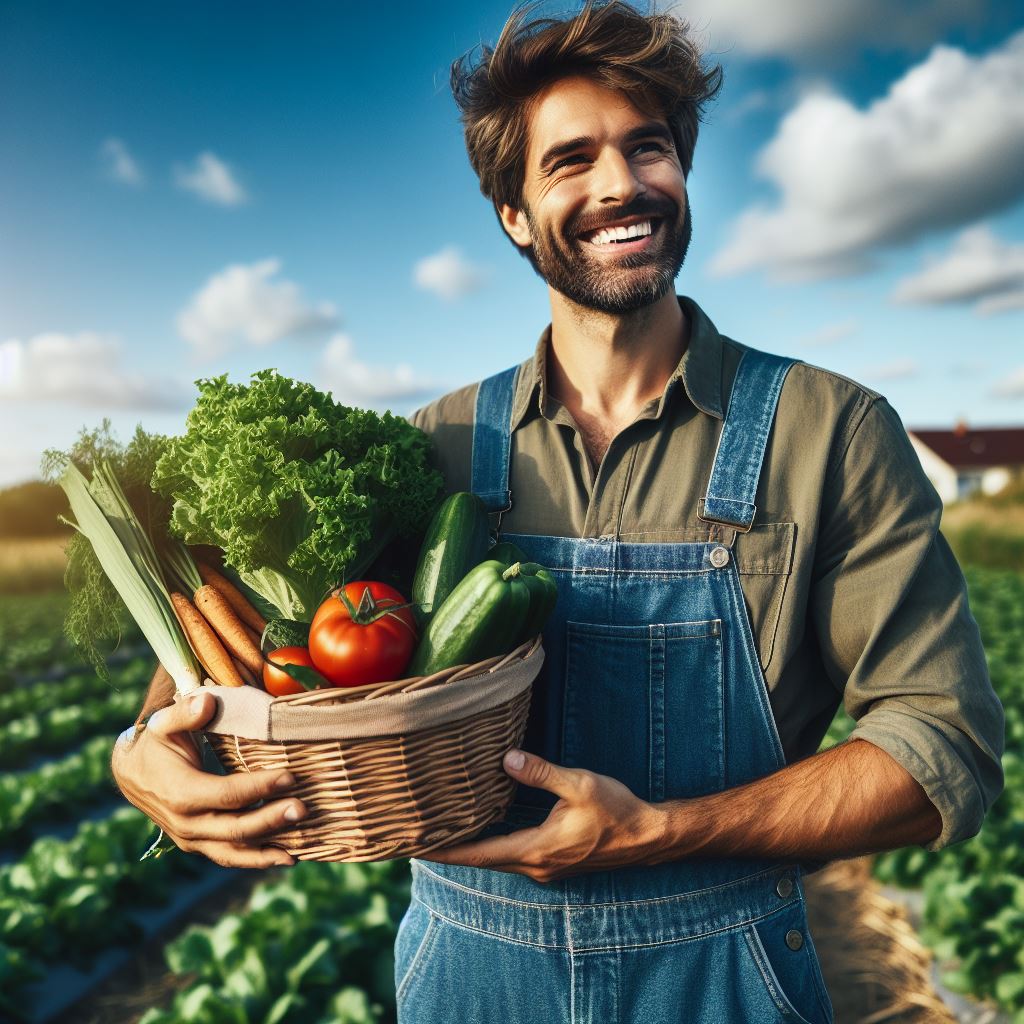Introduction
Let’s explore sustainable tools: Tech in organic agriculture.
Organic agriculture focuses on cultivating crops and raising livestock using methods that prioritize environmental sustainability and avoid synthetic chemicals.
The use of sustainable tools plays a crucial role in organic farming. This blog post will explore the significance of technology in advancing organic agriculture.
Organic agriculture promotes the use of natural fertilizers, crop rotation, and biological pest control to maintain soil fertility and biodiversity.
It avoids the use of synthetic pesticides and genetically modified organisms.
Sustainable tools, such as precision farming technologies and smart irrigation systems, enhance resource efficiency and minimize environmental impact.
They help optimize yields, reduce water and energy consumption, and protect soil and water quality.
This section will delve into various sustainable tools employed in organic agriculture.
It will discuss the advantages of using drones for aerial scouting, robotic weeders for precise weed control, and sensor-based monitoring systems for efficient resource allocation.
Additionally, it will highlight the role of data analytics and artificial intelligence in optimizing farming practices and increasing productivity.
By leveraging technology, organic farmers can improve decision-making, reduce manual labor, and achieve better crop management.
These sustainable tools enable farmers to meet growing food demands while preserving natural resources and conserving biodiversity.
In short, sustainable tools are vital for the advancement of organic agriculture.
They enable farmers to embrace innovative approaches that align with environmentally-friendly practices, maximizing efficiency, and sustainability in the production of organic crops.
Benefits of Sustainable Tools in Organic Agriculture
Organic agriculture is gaining popularity due to its focus on sustainable and environmentally friendly practices.
Transform Your Agribusiness
Unlock your farm's potential with expert advice tailored to your needs. Get actionable steps that drive real results.
Get StartedFarmers who adopt sustainable tools in organic agriculture can reap numerous benefits.
This section explores the advantages of using sustainable tools in organic farming.
Reduced environmental impact
One significant benefit of sustainable tools in organic agriculture is the reduced environmental impact.
These tools allow farmers to use resources efficiently, minimizing waste and reducing the overall carbon footprint.
By optimizing water, energy, and fertilizer usage, farmers can contribute to sustainable farming practices.
Moreover, sustainable tools help minimize soil erosion and water pollution.
Implementing erosion control measures and employing innovative irrigation systems can prevent soil runoff and the contamination of water bodies.
By taking proactive steps to preserve the environment, farmers can ensure the long-term sustainability of their agricultural practices.
Increased crop yield and quality
Another advantage of using sustainable tools is the increased crop yield and quality.
Precision farming techniques, facilitated by these tools, enable farmers to plant, irrigate, and fertilize crops with great precision.
This precision results in higher crop yields and better overall quality.
Additionally, sustainable tools offer innovative methods for pest and weed control, reducing crop damage and improving the marketability and desirability of produce.
Economic advantages
In terms of economic advantages, sustainable tools play a crucial role in cost savings for farmers.
By optimizing resource utilization and reducing the need for expensive inputs, farmers can significantly cut down their production costs.
This leads to higher profits and improved economic viability for organic farming operations.
Furthermore, with the rising consumer demand for sustainable and organic products, farmers using sustainable tools can tap into lucrative markets.
By meeting market demands for sustainable products, farmers can command premium prices and further enhance their profitability.
In fact, the benefits of using sustainable tools in organic agriculture are manifold.
These tools promote resource efficiency, minimize environmental impact, increase crop yield and quality, and offer economic advantages to farmers.
By incorporating sustainable tools into their farming practices, farmers can contribute to a sustainable future while enjoying the rewards of higher profitability and market access.
Embracing these tools is essential for the long-term success of organic agriculture.
Read: Biodiversity: Key to Sustainable Farm Success
Sustainable Tools in Organic Agricultural Practices
In recent years, technology has played a crucial role in revolutionizing organic agriculture practices.
Sustainable tools have emerged, offering farmers efficient and environmentally friendly alternatives to traditional farming methods.
Showcase Your Farming Business
Publish your professional farming services profile on our blog for a one-time fee of $200 and reach a dedicated audience of farmers and agribusiness owners.
Publish Your ProfileThese tools enhance productivity while minimizing negative impacts on ecosystems.
Let’s explore some of the sustainable tools transforming organic agriculture.
Automated Irrigation Systems
Automated irrigation systems are a game-changer in water management.
They significantly improve water usage by precisely delivering water to plant roots, reducing wastage.
These systems also come with real-time monitoring capabilities, allowing farmers to monitor soil moisture levels and adjust irrigation accordingly.
By optimizing water usage, farmers can conserve this precious resource and promote sustainable farming practices.
Precision Farming Technologies
Precision farming technologies have also made their mark in organic agriculture.
GPS-guided equipment enables farmers to carry out precise field operations, such as planting, fertilization, and harvesting.
By accurately mapping fields, farmers can utilize resources efficiently and avoid unnecessary overlap.
Additionally, drones have become valuable tools for crop monitoring.
These unmanned aerial vehicles provide real-time data on crop health, enabling farmers to detect potential issues early and take appropriate actions.
Precision farming technologies ensure that farming activities are targeted, minimizing waste and maximizing productivity.
Biological Pest Control
Biological pest control methods have gained popularity in organic agriculture due to their sustainability.
Instead of relying on chemical pesticides, farmers now utilize beneficial insects to control pest populations.
These insects prey on pests, effectively reducing their numbers. This approach promotes ecological balance, as it avoids harmful chemical residues in the environment.
Additionally, biological agents, such as microorganisms and fungi, are employed to combat specific pests, providing a targeted and sustainable pest management system.
Organic Fertilizers
Organic fertilizers are another essential aspect of sustainable organic agriculture.
Composting techniques transform organic waste into nutrient-rich compost, which improves soil health and fertility.
By recycling crop residues, animal manure, and kitchen scraps, farmers can avoid synthetic fertilizers and reduce waste.
Organic fertilizers not only nourish plants but also contribute to the long-term sustainability of agricultural systems.
In essence, sustainable tools are empowering organic farmers with efficient and environmentally friendly alternatives.
Automated irrigation systems, precision farming technologies, biological pest control methods, and organic fertilizers are transforming organic agriculture.
These tools optimize resource usage, increase productivity, and promote sustainable farming practices.
Embracing these technologies ensures a brighter future for both farmers and the environment.
Read: Crop Rotation: Organic Farming’s Secret Weapon

Success Stories of Sustainable Tools Adoption in Organic Farms
The adoption of sustainable tools in organic agriculture has brought about significant success stories, proving their value and importance in modern farming practices.
In this section, we will examine two specific case studies that highlight the benefits and positive outcomes obtained through the use of these tools.
Case study of a farm using automated irrigation systems
One successful example of sustainable tool adoption in organic farming is the implementation of automated irrigation systems.
Through this case study, we discovered two primary advantages:
Improved water efficiency and reduced costs
By utilizing automated irrigation systems, the farm experienced a significant improvement in water usage.
The systems allowed for precise control and distribution of water, minimizing wastage and reducing overall water consumption.
As a result, the farm saw a reduction in water costs, leading to substantial financial savings.
Positive impact on crop yield and quality
The adoption of automated irrigation systems had a direct correlation to the farm’s crop yield and quality.
The precise control over water distribution ensured that plants received adequate hydration while avoiding overwatering.
This optimized irrigation technique led to healthier crops with improved growth rates, resulting in higher yields and better-quality produce.
Example of a farm utilizing precision farming techniques
Another success story in sustainable tools adoption is seen in farms utilizing precision farming techniques. The following benefits were observed:
Enhanced precision in planting and harvesting
Precision farming techniques, such as the use of GPS-guided machinery and mapping tools, allowed farmers to precisely plant and harvest crops.
This precise control improved the accuracy of planting depth and spacing, resulting in optimal plant growth and uniformity.
Furthermore, farmers were able to harvest crops at their peak ripeness, ensuring higher quality and marketability.
Effective pest and weed control
Precision farming techniques enabled farmers to implement targeted pest and weed control measures.
Showcase Your Farming Business
Publish your professional farming services profile on our blog for a one-time fee of $200 and reach a dedicated audience of farmers and agribusiness owners.
Publish Your ProfileBy utilizing sensors, drones, and data analysis, farmers were able to identify areas of infestation and deploy appropriate interventions accurately.
This precise and timely approach significantly reduced the use of chemical pesticides and herbicides, promoting a healthier and more sustainable farming environment.
These success stories exemplify the tangible benefits brought forth by the adoption of sustainable tools in organic agriculture.
From improved water efficiency and reduced costs through automated irrigation systems to enhanced precision in planting and harvesting processes and effective control of pests and weeds through precision farming techniques, organic farmers have witnessed positive transformations in their farming practices.
By embracing such tools, farms can become more sustainable, efficient, and productive while maintaining their commitment to organic practices.
Read: Water Wisdom: Conserving H2O in Eco-Farms
Challenges and Future Prospects of Sustainable Tools in Organic Agriculture
High initial investment and training requirements
One of the major challenges faced by farmers in adopting sustainable tools in organic agriculture is the high initial investment required.
Implementing technologies such as precision farming, advanced irrigation systems, and smart sensors can be costly, making it difficult for small-scale farmers to afford them.
Additionally, the use of sustainable tools often requires specialized training and knowledge.
Farmers need to understand how to operate and maintain these technologies for optimal results.
This poses a challenge, as not all farmers have access to training programs or the resources to acquire the necessary skills.
However, despite these challenges, governments and organizations can play a crucial role in supporting farmers by providing financial assistance and training programs to help overcome the initial investment and training requirements.
Limited availability of certain sustainable tools
Another challenge in implementing sustainable tools in organic agriculture is the limited availability of certain technologies.
Some regions might not have easy access to tools like precision farming equipment or advanced crop monitoring systems.
This limited availability can be attributed to factors such as lack of infrastructure, high import costs, or insufficient local manufacturing capabilities.
Farmers in these regions face barriers in adopting sustainable tools, which can hinder their ability to improve agricultural practices.
To address this issue, governments and organizations can promote the development and adoption of local manufacturing capabilities for sustainable tools.
This would not only increase availability but also reduce costs and create employment opportunities.
Emerging technologies in organic agricultural practices
Vertical farming and hydroponics
Vertical farming and hydroponics are emerging technologies that offer potential solutions to the challenges faced in organic agriculture.
These techniques involve growing crops in vertically-stacked layers or without soil using nutrient-rich water solutions.
Vertical farming can maximize land use efficiency by utilizing vertical space, making it suitable for urban areas with limited land availability.
Hydroponics, on the other hand, allows for precise control over nutrient delivery and water usage, leading to higher crop yields and reduced environmental impact.
These technologies have the potential to revolutionize food production, ensuring year-round supply of fresh produce while minimizing the use of pesticides and fertilizers.
They also require less water compared to traditional farming methods, mitigating water scarcity issues.
Artificial intelligence in crop management
Artificial intelligence (AI) has the potential to transform organic agriculture by improving crop management practices.
AI algorithms can analyze vast amounts of data from sensors, satellites, and weather stations to provide real-time insights on crop health, irrigation requirements, and pest management.
By using AI-powered systems, farmers can make data-driven decisions and optimize resource allocation.
This can lead to improved productivity, reduced input costs, and minimized environmental impact.
AI can also help detect diseases or nutrient deficiencies at an early stage, enabling timely interventions for crop protection.
However, the adoption of AI in organic agriculture comes with its own set of challenges, including the need for robust data infrastructure, privacy concerns, and potential ethical implications.
Collaborative efforts between farmers, researchers, and policymakers are essential to address these challenges and ensure responsible and equitable use of AI in organic farming.
In a nutshell, while there are challenges in implementing sustainable tools in organic agriculture, such as high initial investments, limited availability, and training requirements, there are also promising technologies that can revolutionize the industry.
Vertical farming, hydroponics, and AI in crop management offer potential solutions to improve productivity, minimize environmental impact, and ensure sustainable food production in the future.
Read: Soil Health: The Heart of Organic Farming
Conclusion
Sustainable tools play a crucial role in promoting environmentally friendly practices in organic agriculture.
They help minimize negative impacts on the ecosystem, enhance soil health, and improve crop productivity.
It is essential for farmers to embrace and implement sustainable tools on their farms.
By doing so, they can contribute to a more sustainable and resilient agricultural system, benefiting both the environment and their economic well-being.
Continuous research and innovation in sustainable tools for organic agriculture are necessary.
This will lead to the development of more efficient, cost-effective, and user-friendly technologies that can further enhance the sustainability and profitability of organic farming.
Showcase Your Farming Business
Publish your professional farming services profile on our blog for a one-time fee of $200 and reach a dedicated audience of farmers and agribusiness owners.
Publish Your ProfileBy recapitulating the importance of sustainable tools, encouraging farmers to adopt them, and calling for further research and innovation, we can pave the way for a more sustainable and productive future in organic agriculture.




